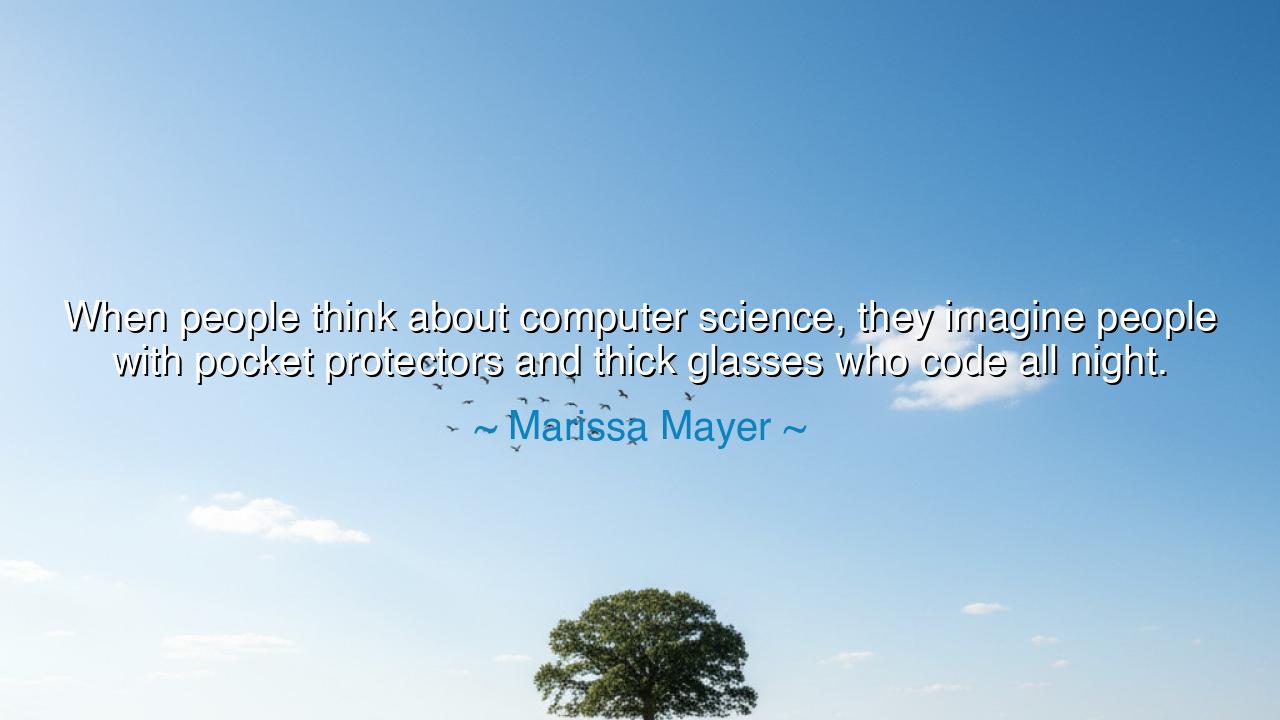
When people think about computer science, they imagine people
When people think about computer science, they imagine people with pocket protectors and thick glasses who code all night.






In the age of great change, where knowledge and invention reshape the very fabric of society, the minds that drive innovation are often misunderstood. Marissa Mayer, with her sharp insight, offers a profound reflection on this misconception, saying, "When people think about computer science, they imagine people with pocket protectors and thick glasses who code all night." This image, ingrained in the collective consciousness, paints the computer scientist as an isolated figure, consumed by the act of coding, distant from the larger human experience. Yet, this view fails to capture the true essence of computer science and the visionary minds that power it.
To understand this, let us first reflect on the ancient philosophers, who were often seen as solitary thinkers, gazing into the vastness of the unknown. Socrates, for instance, was not a mere scholar hidden away from society. Rather, he sought to understand the world in dialogue with others, constantly challenging the status quo and pushing the boundaries of human thought. In much the same way, computer scientists are not merely individuals locked in dimly lit rooms, as the stereotype suggests. They are modern-day visionaries, seeking to connect the unseen threads of the world, weaving them into systems that can transform society.
Mayer's words challenge us to reconsider what we think we know about technology and the people who shape it. The stereotype of the "geek"—the lone coder with his pocket protector and thick glasses—reduces the complexity of computer science to something cold and mechanical. But, as in the case of Ada Lovelace, who is considered the first computer programmer, the world of technology is one of creativity, passion, and vision. Lovelace herself was a poet, blending art with mathematics, and she saw the potential of computing not merely as a tool, but as a means of unlocking the hidden patterns of the universe.
The truth is that computer science is not merely about coding; it is about understanding the structure of the world and designing systems that can solve problems, create new possibilities, and connect people in ways previously unimaginable. Tim Berners-Lee, the inventor of the World Wide Web, is another example. He did not sit in a dark room coding all night. Rather, he sought to bring the world closer together, to create a global network where information could flow freely. The true computer scientist, like these pioneers, is one who sees the future and builds the bridges to carry humanity there.
But in order to build these bridges, they must also have a deep understanding of humanity, not just machines. Consider the story of Grace Hopper, who was not only a mathematician but also a rear admiral in the U.S. Navy. She is celebrated for her work on the development of COBOL, a programming language designed for business use, but more importantly, she saw programming as a means of empowering people to think and solve problems creatively. Hopper understood that technology was not simply about machines and algorithms, but about people, and how we can harness the power of the digital world to improve lives.
Thus, Mayer’s quote serves as a call to break the mold, to challenge the stereotypes that limit our understanding of computer science. It reminds us that the world of technology is not a cold, detached world of machines and numbers, but a vibrant and evolving field driven by visionaries with dreams, compassion, and the desire to make the world a better place. The lesson here is clear: do not judge the future by its surface; what appears as a solitary, mechanical pursuit is often deeply connected to the heart of humanity.
In our own lives, we must learn to see beyond the stereotypes that bind us to outdated views. Whether in the world of technology or any other field, we must embrace the idea that innovation is not just the result of technical skill, but also the product of vision, creativity, and empathy. Those who shape the future are not defined by the glasses they wear or the late nights they spend working, but by their ability to dream, connect, and ultimately transform the world. It is time to shed the outdated perceptions and embrace a more holistic view of innovation—one that acknowledges the humanity at the heart of every technological advancement.






AAdministratorAdministrator
Welcome, honored guests. Please leave a comment, we will respond soon